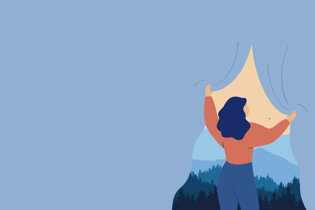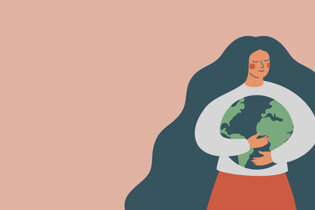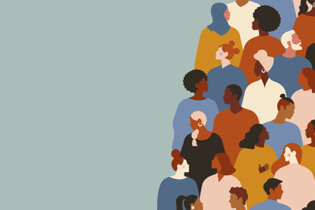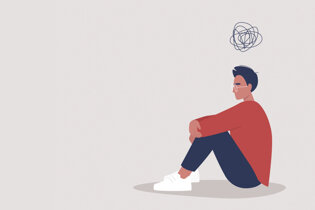It has been proven that getting outside, into green spaces, forests and generally amongst nature, can help relieve us of stress, mild anxiety, fatigue and low mood. The act of getting outdoors to treat these conditions is called ecotherapy.

Keep Calm and Carry on Camping: the Benefits of an Outdoor Holiday
In keeping with our mental health topic, we spoke to some experts in the field and got their take on the latest research showing the benefits of camping and getting outdoors.
Feeling too connected to your phone and not enough to your environment? It's a common complaint in a day and age when every breaking-news alert on a handheld device is liable to cause another flush of anxiety.
So, is it time to switch off, in various meanings of the phrase, and discover the great outdoors? Of course, anyone coping with mental health issues should seek professional help for more tailored guidance and support. But there's much evidence to suggest that taking a break in natural surroundings on a camping holiday can positively impact mental health.
For example, a 2015 study by the Plymouth of University on the effects of camping and children's wellbeing concluded that 95% of the children who took part in the study were happier when camping and that it had provided 93% with valuable skills for later life¹. Proximity to green space has been found to have benefits to a person's state of mind². In comparison, 2013 research stated that camping helped humans reset the body clock to natural sleep patterns and improved the quality of restful sleep³.

Dr Deborah Lee is from Dr Fox Pharmacy, a fully regulated UK online doctor and pharmacy service managed by NHS GPs.
"The importance of getting out of the city and into the countryside cannot be understated. There is a science behind the great outdoors, and much has been written about the health benefits of spending more time in green spaces and immersed in nature."
"Once we accept our place in nature, this affects our emotional responses, our life satisfaction, mental and spiritual wellbeing." ⁴
So why do humans need a break from urban lifestyles and find a rural retreat?
David Brackenridge is Chief Executive Officer of Venture Scotland, a charity that provides outdoor-based, personal development for disadvantaged young people. He's also a rock climber, winter climber, mountaineer and runner who spends most of his free time outdoors.
David says that it's all down to evolution and the sweeping change of pace that comes from modern living:
"Human beings have lived outside and in nature for thousands of years. Only relatively recently have we moved indoors. Our bodies and brains have had no time to evolve to cope with this change. There is something inbuilt into us that craves being in the natural world."
"We spend our lives constantly connected. TV, internet, smartphones, social media and the corporate world all bombard us constantly to try to manipulate what we do and how we act. Being in nature allows us to switch off from that."

Gaby Pilson, an Outdoor Educator at Outforia.com, an online curator for outdoor resources, agrees.
"Within two or three days of being outside, something changes, and I start to feel calm and content with where I am."
"I think this experience is likely common among other people who create outside. By getting outside, into the fresh air, and away from all the various notifications, emails, bills, and other things that eat up our time at home, we give our bodies and our minds a chance to just exist, which is important for our long-term wellbeing."
Victoria Philpott is a travel blogger who discusses mental health at vickyflipfloptravels.com. She's a big believer in tent therapy and says it's a great way to escape our own four walls – so long as you "don't scrimp on the sleeping bag" in order to stay warm and dry.
"It's the perfect way to get away from the news and other people and to just enjoy your surroundings." Victoria says.
"It's a wonderfully relaxed way to travel, once you're there, and a great way to feel the nature around you."
"Just being outside – away from computers and the sofa – is essential for me. I spend so much time sitting down at my laptop, especially this year. Getting to do something different, somewhere different, just makes my mind run differently. I need that space away from my working area. Getting out to clear my head is vital."
Sorry, this YouTube video cannot be displayed.
The following consent is required:
Tracking & performance, Targeting & advertising.
Deborah also states that nature itself provides a health benefit:
"Outdoors, there is much more opportunity to touch the soil, the plants, and trees. Trees and plants emit substances called phytoncides - which we inhale. These have been shown to stimulate the immune system, and in animal studies have been shown to reduce stress and improve relaxation."
She adds that studies have shown that exposure to these substances can lower stress levels, as one 2009 piece of research demonstrated:
"Twelve healthy volunteers stayed in a hotel for three nights and were subjected to phytoncides overnight. Blood tests taken before, during and after their stay showed increased NK cell activity, and lowered concentrations of the stress hormones adrenaline and noradrenaline in the urine, after exposure to phytoncides." ⁵
Still not sure about taking that step, buying that tent and pitching up? It's not unexpected to be nervous about taking a break away from our creature comforts.
If you're in need of advice, Mark Lang, Communications and PR Manager of ecotherapy charity Thrive, suggests starting with the basics for those used to spending most of their time at home or in an office – "just get out in the open."
"Invest some time in nature, and the payback will be more than worth it," he says. "Take a walk in a garden or the countryside; it's a great way to get fresh air, top up Vitamin D from sunlight and get some exercise. Plus, unlike the gym, it's free, and you don't need to wear lycra."

Once just getting out of the house has been achieved, what should you expect and hope to gain from your first campsite experience?
David says:
"I learned everything I know from either friends with experience or from experts (guides and instructors), so, if you can, go with people who have done it before."
"Campsites are great places to meet new people who have experience. People love talking about the kit they have (sleeping bags, tents, stoves, etc.), so go and ask them what works and what doesn't. Start easy – go to a campsite with lots of facilities first, and build up your kit and experience slowly, but don't be afraid to simply give it a go. You might fall in love with it. Don't buy cheap gear. It's cheap for a reason."
Gaby adds:
"If you're feeling a bit apprehensive about going camping or on an ecotherapy holiday, the first thing to remember is that it's okay to be nervous about trying something new."
"To help you get more comfortable with getting outside, consider making your first nature-based holiday a short one to a somewhat familiar place, perhaps a quick weekend trip to a camping area within a short distance of your home. Once you get outside and get an idea of what you should expect, you'll be more excited about future holidays and better able to focus on your mental wellbeing while camping."
So, what should campsites provide to help the wellbeing of their customers?
Mark suggests that in addition to "access to countryside walks", providing "a garden offering a space to get away, sit, relax, recharge and engage with nature in a controlled way would have obvious benefits."
While David looks for campsites that can promise some quiet time, "as we don't get to be 'quiet' in our world very often".

Gaby agrees with this:
"Creating a camping area that truly is quiet and relaxing is important. Many people head outside to enjoy some peace and quiet, but this can be hard to come by in a busy campground."
"One way to mitigate this issue and provide a mental health-focused experience to guests is to have designated campsites in semi-private areas, allowing every group to carve out a small space for themselves where they can truly relax."
Gaby also suggests that campsites can go further to boost the wellbeing of their guests through ecotherapy classes – a form of treatment that involves outdoor activities in nature.
"For campsite hosts who want to truly provide an ecotherapy service for their guests, enlisting the services of a trained professional with experience in nature-based therapy is a good first step," she says.
"Ecotherapy-focused campgrounds could offer daily discussion circles, activities, or even specialised retreats to help individuals with mental health problems."
There is always the benefit of keeping things simple, though, as Victoria explains.
"Just some well-kept, functioning, warm toilets and showers, and a place to charge and get rid of litter are fine for me. I enjoy having the space mentally and physically to think when I'm camping, and too much to do means there's less chance of that. Although, a camp shop is always a welcome addition to ease the pressure of needing to bring everything you might possibly want."
What is clear, though, is that, with the Covid-19 pandemic ongoing and uncertainty all around, camping can be a good option for an escape when lockdowns are lifted for those willing to expose themselves to the elements.
"Camping within your family or social pod is also a nice way to relax without drastically increasing your risk of virus transmission," says Gaby.
"As camping takes place outside, so long as you can stay 2m from people outside your household and you maintain proper hygiene precautions, as per government guidelines, it's a generally low-risk activity."
And, as David says: "The beauty of camping is you can just go and do it. Very little booking is required. You can change your plans quickly if the weather or Covid restrictions change."
Meet the experts

Dr Deborah Lee graduated from the University of Southampton Medical School with a medical degree
She went on to work as a GP and Lead Clinician for many years in the NHS within the sexual and reproductive health department.
She has also worked in medical education.
She now works as a health and medical writer at doctorfox.co.uk - a fully regulated online pharmacy run by NHS doctors.

David Brackenridge is lucky enough to have turned his hobby into his job.
He joined Venture Scotland as a volunteer, later becoming a trustee before becoming CEO of the charity.
Venture Scotland was founded in 1987 by a group of volunteers.
The charity equips disadvantaged young people with new life skills.
It is Scotland's only provider of long term, outdoor based, personal development for disadvantaged young people aged 16-30.

Gaby Pilson is a professional Outdoor Educator, Climbing Instructor, Polar Guide and Wilderness Medicine Instructor.
She graduated from the University of Edinburgh, Hamilton College with a Master’s degree in Outdoor Education.
She now works with Outforia and many other multinational outdoor and health organisations.
Gaby is also an experienced Arctic and Antarctic expedition guide and American Mountain Guides Association Climbing Wall Instructor Course Provider.

Victoria Philpott is a travel writer, blogger (vickyflipfloptravels.com) and self-proclaimed adventurer.
She is a trained Journalist and has visited over 75 countries, working with some of the top travel brands.
Having worked at a summer camp in America, she went on to travel Australia, Mexico, Portugal, Madrid, Dublin, most of Europe, Morocco, Canada, Japan, Southern Africa, Napal, Vietnam, USA and the Serengeti. And all this was done on a shoe-string budget!
Further reading
More information, support and resources about mental health and nature can be found on the Mind website.
References



